Welcome to your Ultimate Gardening Help Guide, where you’ll find expert tips and advice to unlock the full potential of your garden. Gardening can be a fun and fulfilling activity that helps you connect with nature and create a beautiful outdoor space. With the right knowledge and tools, you can create a thriving garden that provides you with fresh produce, beautiful flowers, and a peaceful sanctuary at the same time.
Proper planning, plant selection, care and maintenance, sustainable practices, and biodiversity are all important factors that contribute to a successful garden. Let’s take a closer look at each of these areas and learn how you can apply them to your own gardening journey.
Key Takeaways:
- Proper planning is essential for a successful garden. Assess garden space, sunlight exposure, soil conditions, and climate.
- Choose plants that thrive in your garden’s conditions and provide the necessary care and maintenance for their growth.
- Embrace sustainable gardening practices, such as using organic fertilizers, companion planting, and water-saving techniques.
- Foster biodiversity by planting native species, creating habitats for pollinators, and designing a water feature.
Proper Planning for a Successful Garden
When it comes to gardening, proper planning is the key to success. Before starting your garden, it’s important to assess the layout, size, and purpose of your space. This will help you determine what plants will work best in your garden and where they should be placed.
| Factors to consider when planning your garden: |
|---|
| Sunlight exposure |
| Soil conditions |
| Climate in your region |
Sketching a garden design is also a great way to plan your space. This design should include pathways, flower beds, and any structures you may want to incorporate. By doing this, you’ll have a clear idea of how your garden will look and be able to make adjustments before planting.
When choosing plants for your garden, it’s important to consider the growing conditions in your area. Make sure the plants you choose will thrive in the amount of sun and soil type you have. Additionally, think about the overall aesthetic you want to achieve. Do you want a garden full of colorful flowers or one with a more natural look?
Providing adequate care and maintenance is crucial to the success of your garden. This includes watering appropriately, mulching, pruning, and fertilizing. It’s also important to address any pest or disease issues in a timely manner to prevent them from spreading.
Embracing sustainable gardening practices is not only good for the environment, but it can also save you time and money. Use organic fertilizers and practice companion planting to promote healthy soil and plants. Implement water-saving techniques and install an efficient irrigation system to minimize water waste.
Creating a habitat for wildlife is another important component of a successful garden. Consider planting native species to attract birds, butterflies, and other pollinators to your garden. This not only adds to the beauty of your space but also helps support local ecosystems.
By following these gardening techniques and tips, you can create a stunning and flourishing garden that brings joy and beauty to your outdoor space.
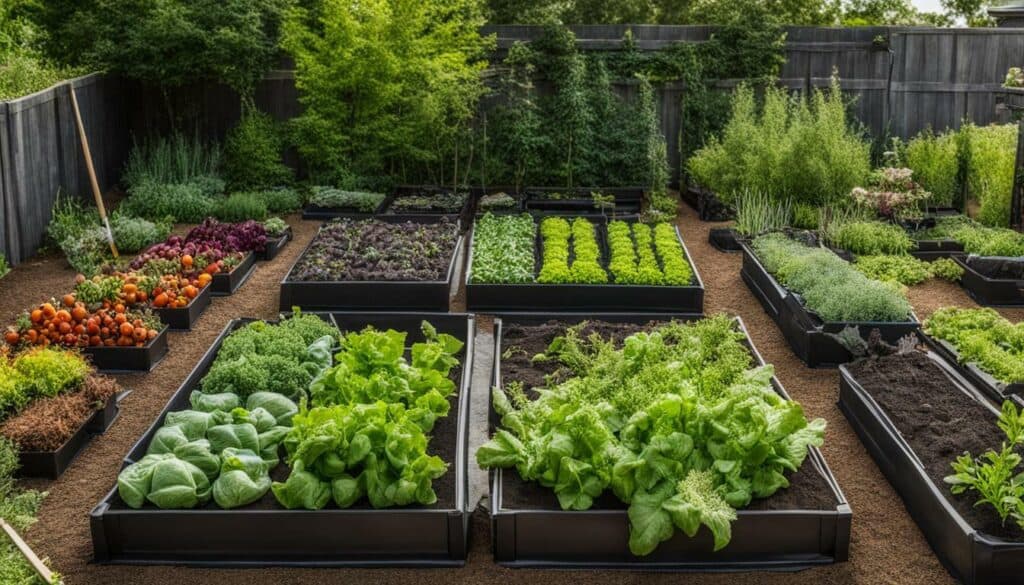
Choosing the Right Plants for Your Garden
The success of your garden depends on choosing the right plants that will thrive in your specific conditions. Before selecting plants, assess your garden space, including sunlight exposure, soil conditions, and climate. This will help you choose plants that will flourish in your garden and minimize plant loss due to unsuitable growing conditions.
When selecting plants, consider the overall aesthetic you want to achieve. Choose a variety of annuals, perennials, shrubs, and trees to add color and texture throughout the seasons. Annuals are perfect for pops of color throughout your garden, while perennials will return year after year.
Provide plants with adequate care and maintenance for healthy growth and development. Ensure proper watering, mulching, and pruning to keep plants happy and healthy. Embrace sustainable gardening practices by using organic fertilizers and compost, practicing companion planting, and implementing water-saving techniques.
Install an efficient irrigation system to deliver water directly to plant roots. This will minimize water waste while ensuring your plants receive the hydration they need to thrive.
Foster biodiversity by planting native species that attract pollinators and creating habitats for wildlife. Native plants are well adapted to your climate and require less maintenance and watering than non-native plants. Plus, they provide important habitat for pollinators and wildlife.
By following these plant care tips and gardening advice, your garden will become a sanctuary of natural beauty.
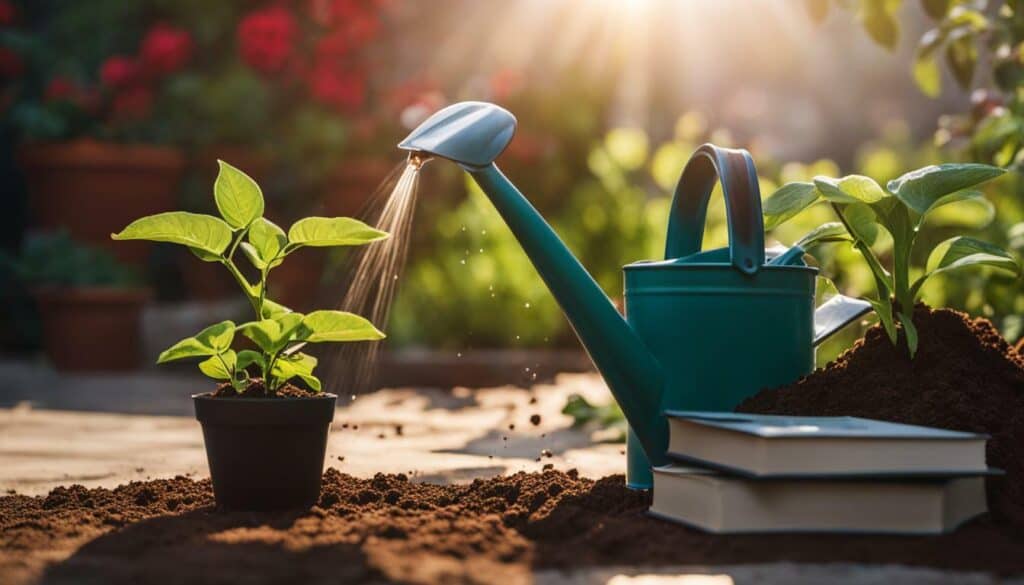
Regular Care and Maintenance for a Beautiful Garden
Keeping up with regular care and maintenance is essential to ensure a beautiful and flourishing garden. Here are some gardening tips and plant care tips to keep your garden looking its best:
| Task | Frequency |
|---|---|
| Watering | Regularly, depending on the plant’s needs and weather conditions |
| Mulching | Every spring and fall, or as needed |
| Pruning | As needed, to shape and promote growth |
| Fertilizing | According to the plant’s needs and the instructions on the product label |
Watering your garden is critical to ensure that your plants stay healthy and thrive. Ensure that the soil is moist but not waterlogged, and adjust the frequency depending on weather conditions. Mulching your garden helps to retain moisture in the soil, suppress weeds, and regulate soil temperature. Pruning your plants regularly helps to shape them and promote growth.
Fertilizing your garden provides it with essential nutrients. Be sure to follow the product instructions on the label, as overfertilizing can harm the plants. Using organic fertilizers is also encouraged, as they promote soil health and are better for the environment.
Regularly assessing your plants’ health and monitoring soil moisture levels will ensure they are thriving. Promptly addressing any issues with pests, diseases, or drainage will prevent them from spreading and causing damage to other plants.
By incorporating these gardening tips and plant care tips, your garden will flourish, providing you with a beautiful oasis of natural beauty and a connection to nature.
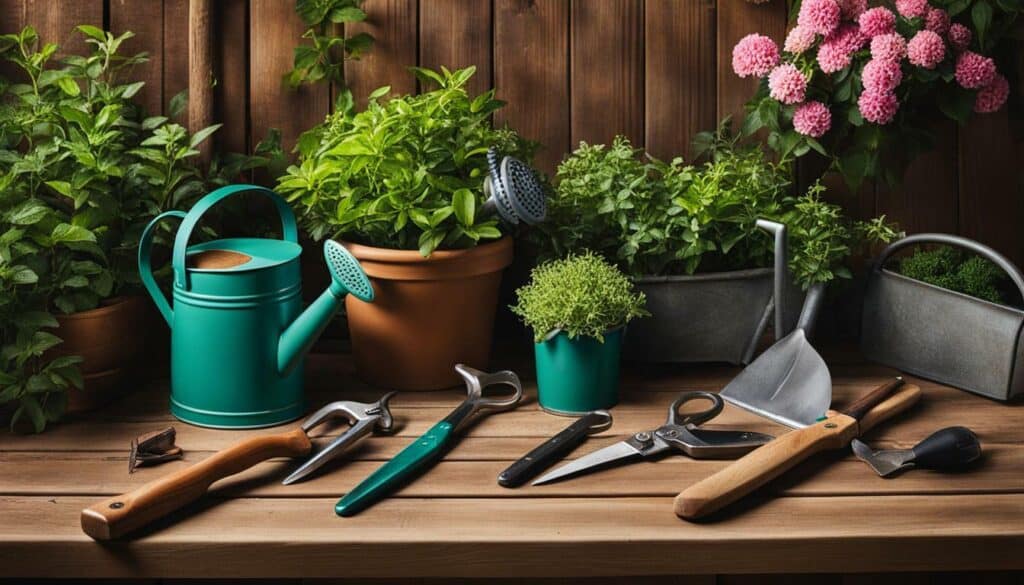
Embracing Sustainable Gardening Practices
Embracing sustainable gardening practices not only benefits the environment but also enhances the health and vitality of your garden. Proper planning is the first step towards sustainability, taking into account factors such as sunlight exposure, soil conditions, and climate.
Choosing the right plants that thrive in your garden’s conditions is also important, including a mix of annuals, perennials, shrubs, and trees.
Providing adequate care and maintenance, such as proper watering, mulching, and pruning, will ensure the health and longevity of your garden. In addition, embracing sustainable practices like using organic fertilizers, practicing companion planting, and implementing water-saving techniques will further reduce the environmental impact.
Efficient irrigation systems are also key to a sustainable garden. Using drip or soaker hoses, rather than sprinklers, can minimize water wastage and promote deep root growth. Additionally, creating biodiversity and wildlife habitats, such as planting native species and leaving areas for wildlife, can contribute to a healthy and sustainable garden.
By following these tips and embracing sustainable gardening practices, your garden will become a sanctuary of natural beauty and contribute to a greener planet. So go ahead and take the initiative, it’s never too late to make a difference!
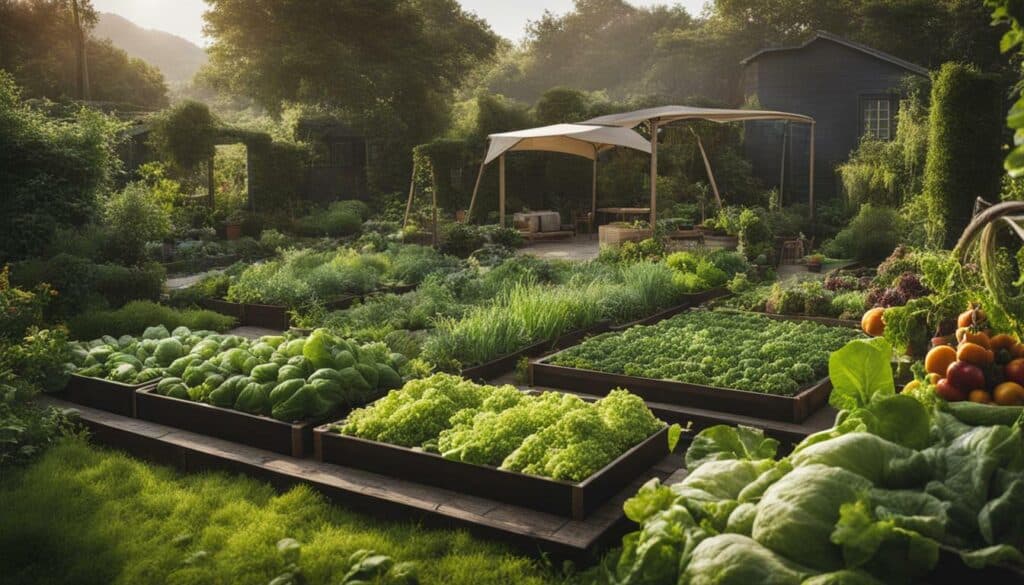
Efficient Irrigation Systems for Plant Health
Proper irrigation is crucial for maintaining the health and vitality of your plants. It is essential to choose the most efficient watering system to minimize water wastage and deliver water directly to the root zone of plants.
Options such as drip irrigation, soaker hoses, or automated sprinkler systems are designed to promote optimal plant growth while conserving water. These systems should be considered when planning and maintaining a garden to ensure optimal plant health.
Adjusting watering schedules according to the seasons and monitoring soil moisture levels is also important. Over-watering or under-watering your plants can lead to issues such as root rot, fungal diseases, and stunted growth.
Implementing efficient irrigation practices not only promotes plant growth but also conserves water. In fact, studies have shown that drip irrigation systems can reduce water usage by up to 60% compared to traditional sprinkler systems.
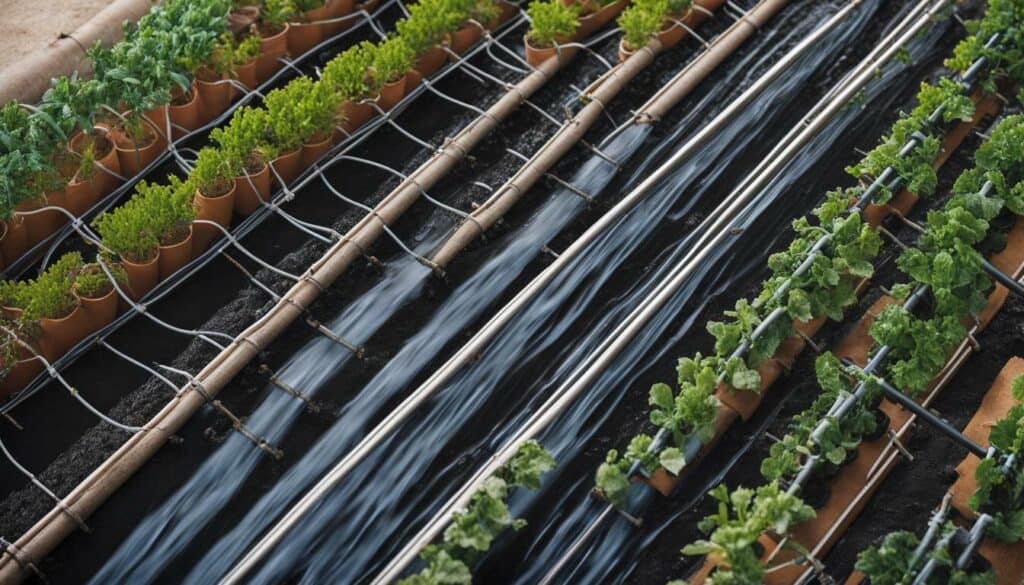
Efficient irrigation systems are an investment in the long-term health of your garden. By using these systems, you are not only saving water but also saving time and effort in maintaining your plants. It’s a win-win situation!
Fostering Biodiversity in Your Garden
Fostering biodiversity in your garden contributes to a healthy ecosystem and supports local wildlife. When planning your garden, selecting native species is crucial for supporting the surrounding ecosystem. Native plants are adapted to local conditions and attract local wildlife, such as pollinators, birds, and beneficial insects.
Another way to promote biodiversity is by incorporating flowering plants with different bloom times. This creates a continuous food source for pollinators and other insects throughout the growing season. Providing shelter for beneficial creatures, such as birdhouses and bug hotels, also encourages biodiversity in your garden.
| Tip: | Consider incorporating a pollinator habitat, such as a butterfly garden or a wildflower meadow, to support local populations of bees, butterflies, and other pollinators. This not only helps biodiversity in your garden but also contributes to the health of surrounding ecosystems. |
|---|
By embracing sustainable gardening practices and creating a supportive environment for local wildlife, you can foster diversity in your garden and contribute to a healthier ecosystem for all.
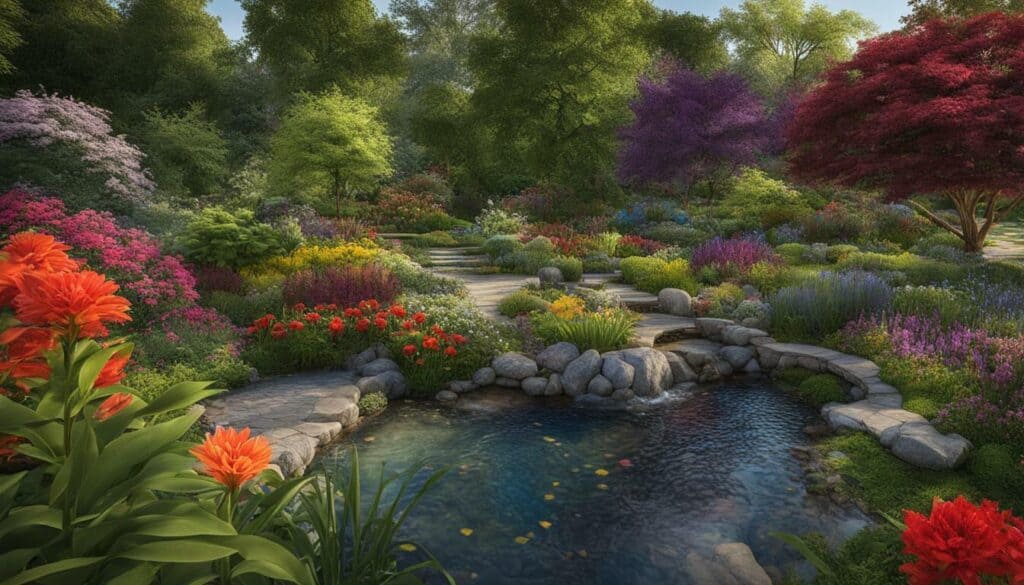
The Benefits of Gardening for Mental Health
Gardening not only nurtures your plants but also provides numerous benefits for your mental health. According to research, spending time in nature or around plants can boost memory, concentration, and overall well-being while reducing stress levels. Engaging in gardening offers the opportunity to create an outdoor space that serves as a haven of natural beauty and offers a therapeutic and fulfilling hobby.
As a beginner gardener, it’s important to remember that proper planning, selecting the right plants for the environment, and consistent care and maintenance are essential for a successful garden. With sustainable gardening practices, such as using organic fertilizers, practicing companion planting, and implementing water-saving techniques, you can not only promote a healthier garden but also contribute to a greener planet.
Gardening also fosters biodiversity and can be a habitat for various wildlife species. Consider planting native species and creating pollinator habitats to support local ecosystems. A biodiverse garden can provide additional benefits such as improved soil nutrition and pest control.
Investing in the right tools and soil enrichment can make gardening easier and lead to healthier plants. Compost and organic matter can enrich the soil, making it easier for your plants to grow and thrive. Don’t forget to water your plants effectively. Efficient irrigation systems that minimize water wastage are essential for plant health.
The wonders of the plant world can be witnessed in your backyard with some expert gardening tips. Allow yourself the opportunity to unwind, connect with nature, and enjoy the therapeutic benefits of gardening. Start small and experiment with different gardening techniques and plant species to find what works best for you.
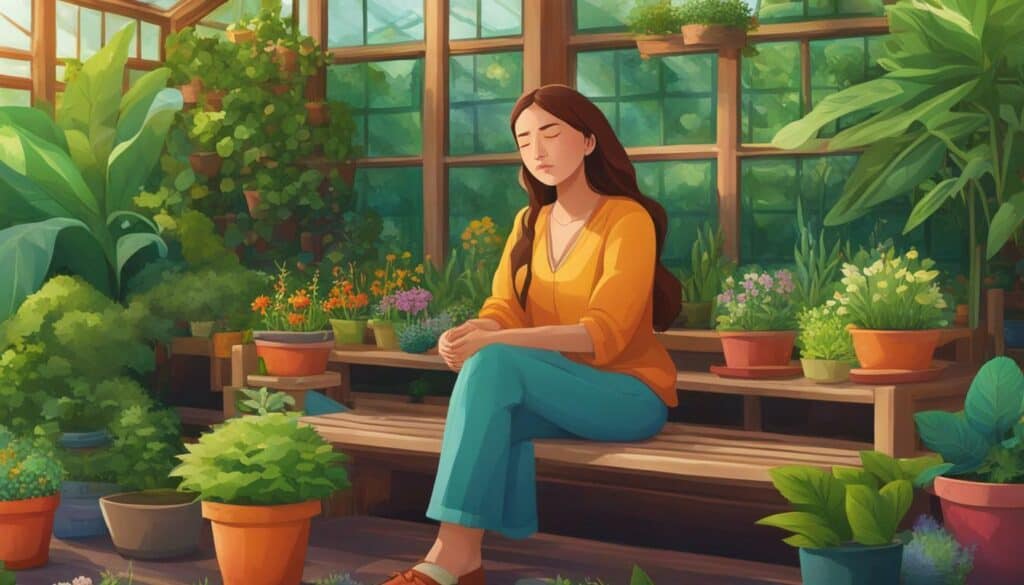
Investing in the Right Tools and Soil Enrichment
Having the right tools and enriching your soil are essential for successful gardening. It’s important to invest in good-quality gardening tools that are durable and comfortable to use. Basic tools like a shovel, hoe, rake, and pruning shears are a must-have for any gardener.
In addition to the right tools, enriching your soil with compost and organic matter will lead to healthier plants and a more productive garden. Compost adds nutrients to the soil and helps retain moisture, which is crucial for plants to grow. You can make your own compost by adding kitchen scraps, yard waste, and other organic matter to a compost bin.
| Gardening Tool | Use |
|---|---|
| Shovel | For digging holes and moving soil or compost |
| Hoe | For breaking up soil and removing weeds |
| Rake | For leveling soil and removing debris |
| Pruning shears | For trimming and shaping plants |
Adding commercial fertilizers can also help improve soil quality, but it’s important to be aware of any potential environmental impact. Organic fertilizers, like fish emulsion or bone meal, are good alternatives that are safe for the environment.
When selecting plants for your garden, choose varieties that are well-suited for your soil type and the amount of sunlight and water they will receive. Native species are a good choice, as they are usually easier to maintain and require less water and fertilizer.
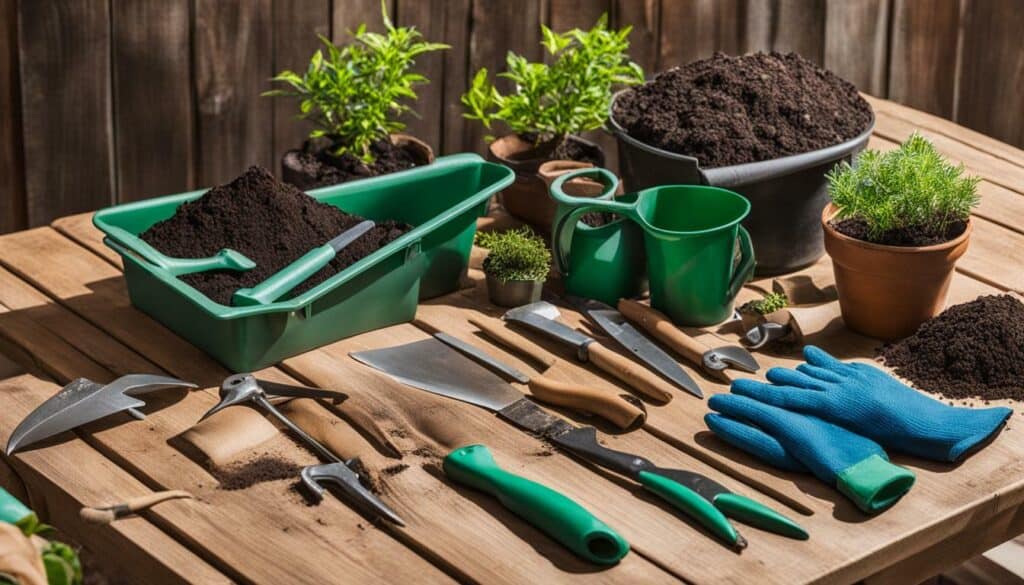
In summary, investing in the right tools and soil enrichment is crucial for successful gardening. Planning and selecting the right plants for the garden’s conditions is important. Regular care and maintenance, sustainable gardening practices, efficient irrigation systems, and fostering biodiversity and wildlife habitat also contribute to a thriving garden. Enriching the soil with compost and organic matter and choosing well-suited plants that thrive in the environment and are easy to maintain are key to successful gardening.
Conclusion
With the knowledge and expert tips shared in this Ultimate Gardening Help Guide, you are well-equipped to cultivate the garden of your dreams. Gardening is a fulfilling and therapeutic hobby that offers numerous benefits to our health and well-being. Proper planning is crucial for a successful garden, taking into account factors such as sunlight exposure, soil conditions, and climate. Choosing the right plants for your garden is also essential, paying attention to their growth habits and maintenance requirements.
To maintain a beautiful garden, regular care and maintenance are necessary, including proper watering, mulching, pruning, and fertilizing. Moreover, embracing sustainable gardening practices, such as using organic fertilizers and practicing companion planting, can help reduce environmental impact. Efficient irrigation systems and fostering biodiversity will further enhance your garden and attract pollinators.
Investing in the right tools and enriching your soil with compost and organic matter can make gardening easier and healthier for your plants. Finally, gardening offers a wonderful opportunity to improve your mental health, increase your focus and concentration and reduce stress levels.
By following these tips and embracing the wonders of the plant world, you can create a stunning and flourishing garden that will bring you joy and tranquility. Now, go ahead and get your hands dirty – the rewards are well worth the effort!
How Can I Improve My Gardening Skills and Green Thumb?
Transform your garden into a lush oasis by greening your garden with expert advice. Enhance your gardening skills and develop a green thumb by learning from experienced professionals. Discover helpful tips, techniques, and innovative ideas to cultivate a thriving and vibrant garden. Take the first step towards a greener space today.
What Are Some Expert Tips for Achieving Green Thumb Success in Gardening?
Achieving ultimate gardening success tips requires careful planning and attention to detail. Begin by selecting plants suitable for your climate and soil conditions. Ensure proper watering, as overor under-watering can harm plants. Regularly monitor for pests and diseases, promptly addressing any issues. Incorporate organic fertilizers to promote healthy growth. Finally, regular pruning and mulching will help maintain the overall health and appearance of your garden.
FAQ
Q: How important is proper planning for a successful garden?
A: Proper planning is key to a successful garden. Assessing your garden space, sunlight exposure, soil conditions, and climate are crucial to determine the right plants and design for your garden.
Q: How do I choose the right plants for my garden?
A: When choosing plants, consider the growing conditions and desired aesthetics. Research different plant species and opt for a mix of annuals, perennials, shrubs, and trees that will thrive in your garden environment.
Q: What are some regular care and maintenance tips for a beautiful garden?
A: Regular care and maintenance are necessary for a beautiful garden. Water plants appropriately, mulch to conserve moisture, and address pests and diseases promptly to ensure the health and vitality of your plants.
Q: How can I embrace sustainable gardening practices?
A: Embrace sustainable gardening practices by using organic fertilizers, practicing companion planting, and implementing water-saving techniques. These practices protect the environment and promote the long-term health of your garden.
Q: Why are efficient irrigation systems important for plant health?
A: Efficient irrigation systems are important for plant health as they minimize water wastage and ensure that plants receive the right amount of water. Install a watering system that conserves water and promotes optimal plant growth.
Q: How can I foster biodiversity in my garden?
A: Foster biodiversity in your garden by planting native species and creating habitats for pollinators and other wildlife. This promotes a healthy and balanced ecosystem and contributes to the overall vitality of your garden.
Q: What are the benefits of gardening for mental health?
A: Gardening has numerous benefits for mental health, including improved memory, concentration, stress relief, and overall well-being. Spending time in nature and nurturing plants can have a positive impact on your mental and emotional state.
Q: How can I invest in the right tools and enrich the soil for better gardening?
A: Invest in the right gardening tools and maintain them for easier gardening. Enrich the soil with compost and organic matter to improve its fertility and provide essential nutrients for your plants.
Source Links
- https://woombie.com/blog/post/the-ultimate-gardening-guide-tips-and-tricks-for-a-beautiful-garden
- https://www.ozbreed.com.au/the-ultimate-gardening-guide-1-practical-advice-for-beginners/
- https://www.amazon.com/New-Western-Garden-Book-Gardening/dp/0376039205
- https://www.amazon.com/Ultimate-Gardening-Guide-Universitys-Questions/dp/146211816X
- https://www.almanac.com/how-plan-your-garden-10-step-process
- https://growinginthegarden.com/garden-planning-in-5-simple-steps/
- https://www.homesandgardens.com/advice/how-to-plan-a-garden
- https://www.thespruce.com/plant-selection-for-the-landscape-2131865
- https://www.realhomes.com/advice/how-to-choose-plants-for-your-garden
- https://www.gardenersoasis.com/pick-the-right-plants/
- https://www.bhg.com/gardening/yard/garden-care/gardening-tips-for-every-gardener/
- https://constructionhow.com/garden-maintenance-tips-for-a-healthy-and-beautiful-garden/
- https://www.housebeautiful.com/uk/garden/a585/top-tips-garden-maintenance/
- https://wickerpark.ca/blogs/test-blog-category-6/sustainability-the-environment-embracing-sustainable-gardening-practices
- https://www.ecogardeners.com/gardening-landscaping-tips-info/eco-gardening-tips-for-greener-garden/
- https://gardening.org/sustainable-gardening-practices/
- https://www.gardeners.com/how-to/how-to-choose-a-watering-system/8747.html
- https://extension.unh.edu/blog/2020/08/irrigation-systems-garden
- https://www.gardenandgreenhouse.net/integrating-efficient-irrigation-systems-in-your-garden/
- https://www.kew.org/read-and-watch/how-to-make-your-garden-more-biodiverse
- https://www.missouribotanicalgarden.org/gardens-gardening/your-garden/help-for-the-home-gardener/advice-tips-resources/visual-guides/adding-biodiversity-to-your-garden
- https://conservingcarolina.org/bring-biodiversity-and-its-benefits-to-your-garden/
- https://agrilifetoday.tamu.edu/2022/04/25/the-positive-effects-of-gardening-on-mental-health/
- https://www.ncbi.nlm.nih.gov/pmc/articles/PMC6334070/
- https://www.webmd.com/mental-health/how-gardening-affects-mental-health
- https://miraclegro.com/en-us/gardening-101/tools-for-gardening.html
- https://www.texasgardener.com/investing-in-the-right-tools-gadgets-equipment-accessories-will-keep-you-gardening-forever/
- https://growingourown.wordpress.com/6-conclusion/
- https://www.ncbi.nlm.nih.gov/pmc/articles/PMC6600618/

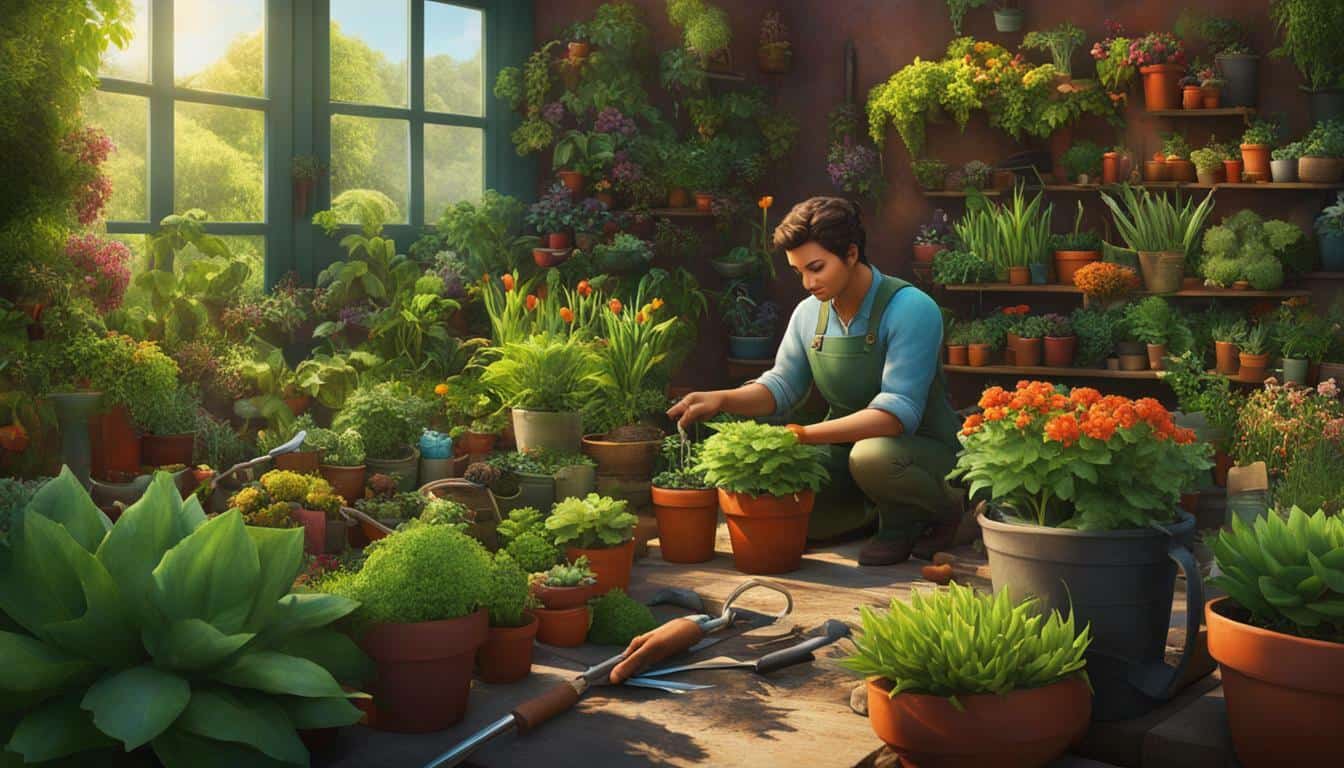
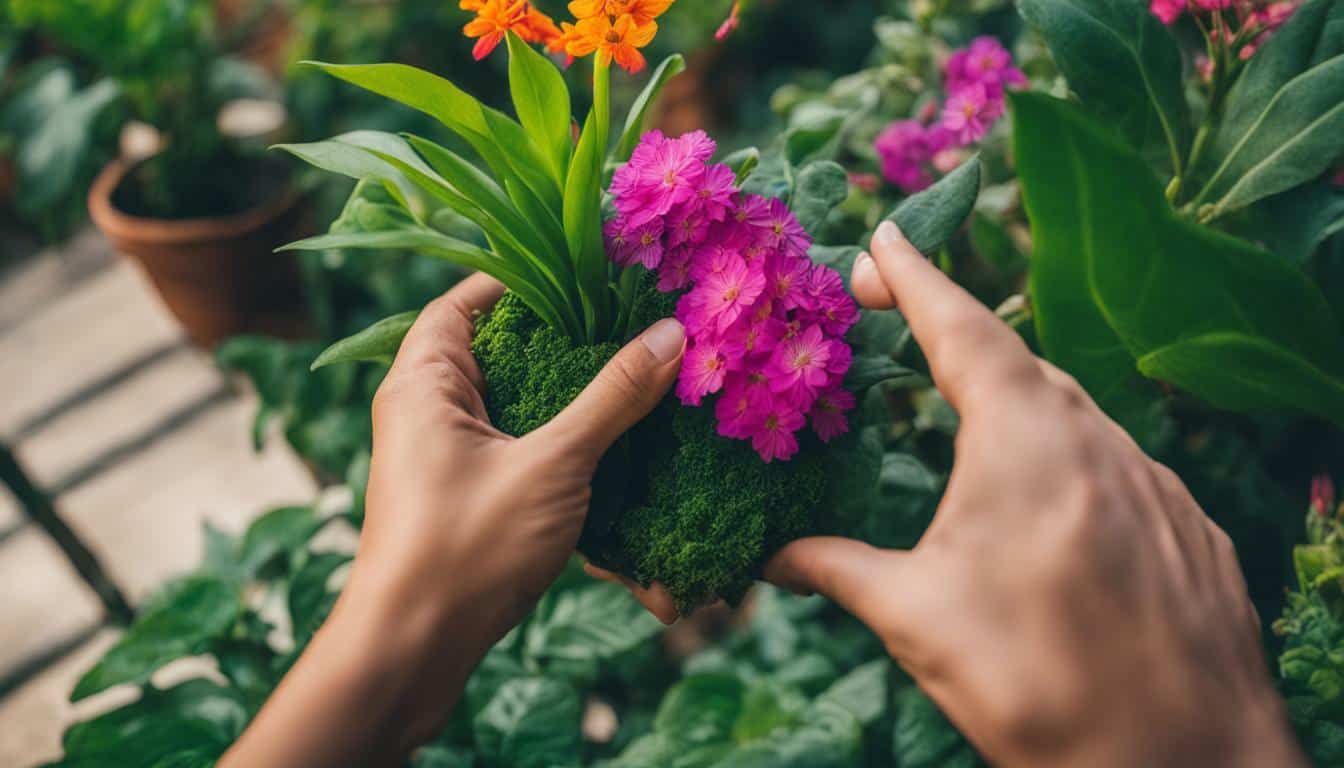
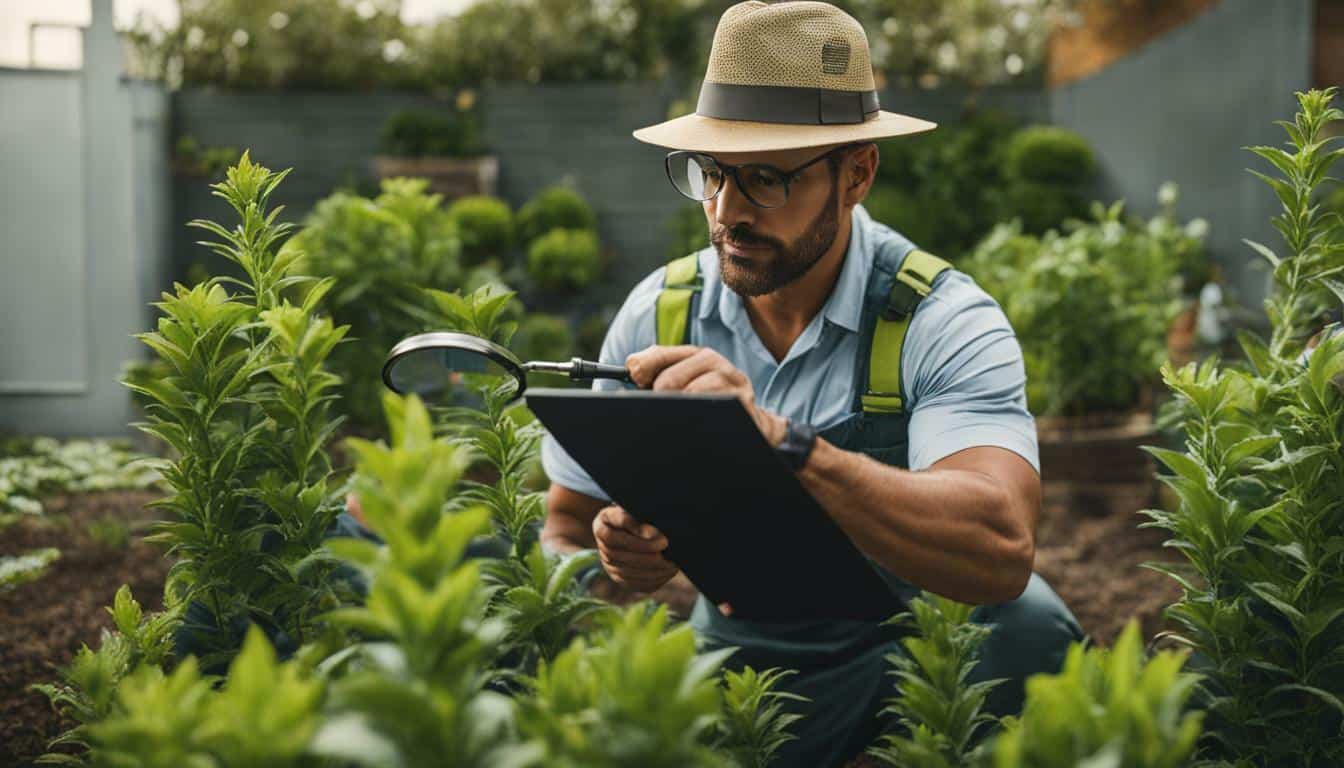

Leave a Reply